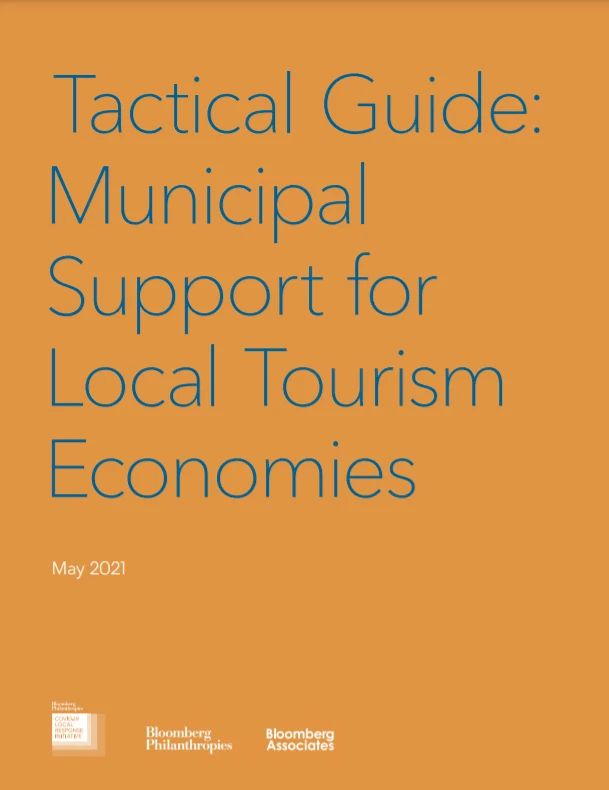COVID-19 Economic Response and Recovery
Help Your Industry to be at the Front of “The New Normal”
Action:
Convene thought leaders, analysts, entrepreneurs, and tech startups to focus on technology development and adoption that could reshape travel and tourism.
Why:
The pandemic is turning the travel industry upside down and has changed the way people think about travel. “The next incarnation of tourism is on its way.”
Background:
Thanks to the internet, the ways that people travel have changed drastically in a short span of time. Technology has made traveling safer and less time consuming, changed the way we book a flight or room, the way we are informed of events, or seek advice to sightsee a city. It has allowed us to have more personalized experiences, helped us to surpass language barriers, and even changed our packing routines. It is also impacting how destinations and those in the tourism industry market their products and services.
For example, data analytics, cloud computing and devices which are connected to the Internet-of-Things allow personalization for a better customer experience. Smart conversational interfaces have become more useful in providing feedback and answering customer questions. Free mobile connectivity not only allows travelers to share their experiences with others through social media easily, it also allows a destination to collect data about their travelers during different steps of the visit— which can help them sell the right product to the right visitor at the right time.
Case Study
Singapore Tourism Accelerator
Some cities are not only focusing on the immediate effects of the pandemic on the travel industry, they are also taking a longer-term perspective. For example, the Singapore Tourism Board has partnered with Ravel Innovation to create the Singapore Tourism Accelerator. It targets startups that are developing solutions to future-proof the travel and tourism industry and help tourism companies thrive amidst the challenges brought about by COVID-19. During the 4 month program, the selected startups develop pilot solutions to challenges which have been defined by local travel and hospitality businesses.
For example, convention and events businesses in Singapore are seeking a solution for the following challenge:
Current visitor, exhibitor, speaker and competition data collection/analysis is insufficient for customer insights and limits the ability to design personalized, hybrid experiences for the MICE sector. The company will design an online-to-offline (O2O) visitor management solution that can capture exhibitors and visitors’ data (e.g., interactions, transactions), analyze and profile visitors to help design better experiences and business matchmaking.
The chosen startup will gain unparalleled access to the leading industry players, and can also get assistance with temporary relocation to Singapore.

How To Adopt This Approach:
Identify an experienced tech accelerator partner and decide the size and cadence
of your cohorts (the Singapore Tourism Accelerator runs two rounds a year, each
with up to 12 companies).
Create an application process with clear selection criteria for admission to the accelerator. Promote the program extensively, through government colleagues, tech membership groups, incubators, universities, social media, conferences, and in person.
Design an accelerator program. The Singapore Tourism Accelerator consists of two phases:,a 2-week “acceleration” bootcamp, and a 3-month “pilot” phase. The bootcamp comprises modules, workshops, mentoring sessions, and events to help program participants define value propositions and use-cases, in collaborations with matched industry partners. During the pilot phase, participants work with industry partners to build prototypes and assess the feasibility of scaling up their solutions. The prototypes are funded by industry partner grants.
Finally, plan a demo day for participants to showcase their solutions to a wide set of industry partners and investors.

Do:
- Do recognize that many governments and DMOs are siloed, risk-averse, and bureaucratic organizations, and will find it very hard to digitally transform. Therefore, partner with brands and technology vendors which are better placed to develop solutions.
- Do seek innovative business and revenue models, where each party contributes something and each party benefits. Governments and DMOs should not underestimate the value of their authority, bully pulpit, data, audience reach and engagement, relationships, and ability
to “get things done” in the city.
Don’t:
- Don’t try to turn a DMO into a tech development company, as this is not your core strength.
- Don’t undervalue your assets and don’t simply hand over your data. Try to price what it would cost the vendor/partner to purchase these assets or achieve the same benefits on the open market.
